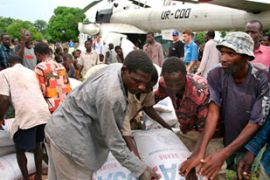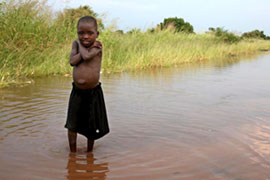Mozambique seeks aid after floods
Thousands of people need basic supplies as more rain is forecast.

Access roads cut
Many of the people displaced by the floods were cut off from the rest of Mozambique as the rising waters from the Zambezi river cut off access roads and washed out bridges.
| Your Views |
More people are expected to lose their homes as heavy rain is forecast and the floodgates of dams along the river need to be opened because they are in danger of bursting.
Some people have refused to leave their homes, the maize crop that would have been harvested next month, the livestock that is their life’s savings.
Jaco Klopper, the United Nations operations chief, told the Associated Press news agency: “This is the problem: people don’t want to leave their goats, then the waters rise and they end up clinging to trees and we have to come and save them when we don’t have the resources.”
Zucula, who on Tuesday visited the worst hit region of Mutarara in the northern province of Tete, where more than 17,000 people are living in makeshift shelters built from twigs and grass, said food and sanitation were now priorities.
“The rains are making our operations very difficult, probably we will call for help in air assistance in air lifting operations … we will ask for this help now,” he said.
Food aid
The United Nations World Food Programme began distributing food to evacuees on Tuesday, but the operation has been complicated by poor access roads.
 |
| More than 80,000 people have been displaced by the flooding [EPA] |
“We have not eaten anything since we arrived here last week,” said Johane Balicholo, an official in charge of the Samarusha accommodation centre in Mutarara. “Children will die and we cannot feed them with wild fruit because it’s too dangerous.”
The scale of the suffering has drawn comparisons to the floods in 2000 and 2001 that killed about 700 people in southern and central Mozambique.